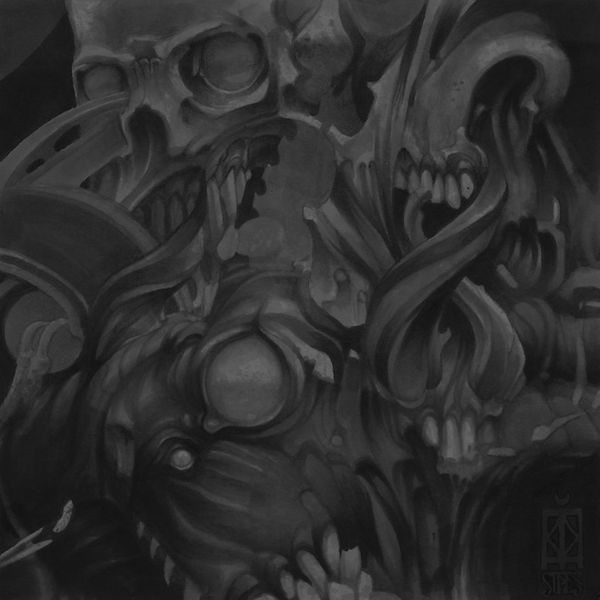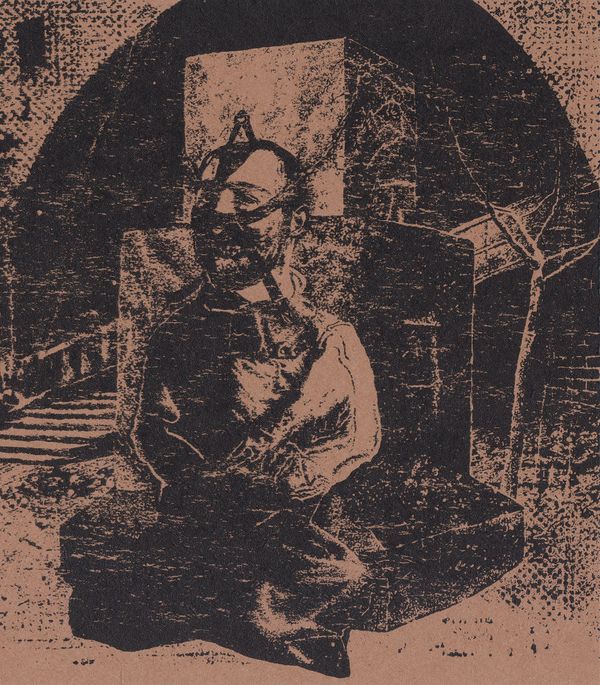Triumphs: Computer Man

Computer Man, the sophomore release from Dunedin, New Zealand instrumental duo Triumphs, contains its fair share of delicately balanced ingredients. That might seem hard to believe, given that the band specialise in ear-splitting sludge, math rock, and post-metal. But the nuance threaded into all that noise speaks of a more creatively ambitious album than the band’s debut.
Computer Man also furthers Triumphs’ defiance of genre, which raises an obvious comparison with Wellington two-piece Into Orbit. Like Into Orbit, Triumphs have upped the artistic ante on their second album, and their music is also frequently built around crashing crescendos. Similarly, parts of Triumphs’ songs sound like they were recorded by a band at least twice the size. But there are clear differences between Into Orbit and Triumphs as well.
For a start, Into Orbit and Triumphs often traverse very different sonic terrain, and Triumphs have a far rougher edge to their sound. (FYI: that’s not a criticism.) Triumphs’ drummer, Mat Anderson, and guitarist John Bollen worked with producer Dale Cotton on their 2015 debut, Beekeeper/Bastardknocker, and they wisely chose to use Cotton’s recording, mixing, and mastering skills on Computer Man too. Cotton’s probably most famed, in the world of heavy music at least, for his work on Beastwars’ first two albums. And if you enjoyed the burly tone and texture of those releases, then the percussive punch and barbed riffs of Computer Man might tick the boxes for you too.
 Computer Man is a notable step up from Triumphs’ debut. Especially in its more nuanced contrasting of mammoth and melodic elements. It’s both heavier and gentler than Beekeeper/Bastardknocker, and it’s far darker and yet also more emotionally uplifting too. To my ears, that shows a band learning from their first full-length. Because, while Beekeeper/Bastardknocker featured plenty of interesting music, it also highlighted that a two-piece instrumental group has to work hard to hold your attention.
Computer Man is a notable step up from Triumphs’ debut. Especially in its more nuanced contrasting of mammoth and melodic elements. It’s both heavier and gentler than Beekeeper/Bastardknocker, and it’s far darker and yet also more emotionally uplifting too. To my ears, that shows a band learning from their first full-length. Because, while Beekeeper/Bastardknocker featured plenty of interesting music, it also highlighted that a two-piece instrumental group has to work hard to hold your attention.
A lack of a vocal hook is one thing, but when you’re only using a couple of instruments you’ve got a limited set of tools to tell a gripping tale. We’ve all heard proficient musicians create sterile instrumental music that fails to connect emotionally. But, thankfully, the majority of Triumphs’ songs are musically lyrical and the band certainly write engaging, albeit wordless, stories on Computer Man.
Tracks like “Tomb of Christopher Columbus” and the acid-fired “Ode to Friendship” hurl sludgy riffs at crashing drums, which sends the bruising music within tumbling from one summit to the next. “Computer Man” and “Space Embrace” showcase that precise, almost math-rock counterpointing of melodic and thundering passages. And a more astute understanding of arranging is present, highlighting two creatively aligned musicians writing smarter songs.
 Elsewhere, the 10-minute “Twang of the Void” (my favourite track here by far), sets its sights on the great beyond and explores both density and space while mixing third-eye-opening psychedelics with propulsive metal. There’s a lot to be said for Computer Man’s shorter and more immediately crushing tracks too. And “South of Denim” and “Ditch Witch” both deliver glorious gut-punch blasts of grungy noise.
Elsewhere, the 10-minute “Twang of the Void” (my favourite track here by far), sets its sights on the great beyond and explores both density and space while mixing third-eye-opening psychedelics with propulsive metal. There’s a lot to be said for Computer Man’s shorter and more immediately crushing tracks too. And “South of Denim” and “Ditch Witch” both deliver glorious gut-punch blasts of grungy noise.
Issues? Well, you could probably argue that some tracks on Computer Man suffer from the problem that haunts all heavy, genre-blending instrumental rock: a lack of distinctiveness. A song like “The Empire Never Ended” is guilty of that. And it could have been cut to shorten Computer Man’s lengthy running time easily enough.
Triumphs also operate in the same sphere as bands such as Mogwai, Pelican, or Russian Circles, and they’ve all produced celebrated instrumental works. Occasionally, that means there’s a sense of: “I’m sure I’ve heard that somewhere before." To be clear, I’m not suggesting Triumphs are plagiarizing anyone. But they do reside in a recognisable realm, and they’re not blazing a new trail here. In other words, if you weren’t already a fan of heavy hybrid instrumental rock, I doubt Computer Man is going to change your mind.
To be clear, I’m not suggesting Triumphs are plagiarizing anyone. But they do reside in a recognisable realm, and they’re not blazing a new trail here. In other words, if you weren’t already a fan of heavy hybrid instrumental rock, I doubt Computer Man is going to change your mind.
To be fair though, plenty of fans obviously love those hybrid motifs, and to Triumphs’ credit they haven’t just blindly repeated them over and over. A song like “Space Embrace” takes an entirely different tack and has a completely different temper to a track like “South of Denim”. And throughout Computer Man, Triumphs endeavour to deliver plenty of similarly dextrous and divergent musical manoeuvres.
Essentially, that’s what marks Computer Man as a success. It delivers on the sludge and blended post/metal front, but it also reaches higher and digs deeper than Triumphs’ debut. It’s a more dynamic and adventurous album, and it’s that much more impactful as a result. Best of all though, Computer Man avoids any technical showboating in favour of expressive storytelling. Not a single word is spoken on the album, but Computer Man still tells a vivid and often enthralling tale.



